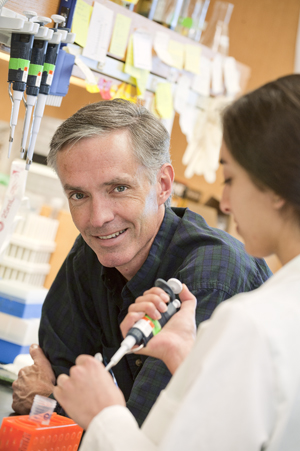Medicine’s Brave New World
ENG’s Collins keynotes symposium on technology’s promise, limits

In the 1970s, while astronauts were walking on the moon, a series of strokes crippled one of Jim Collins’ grandfathers, and the other went blind. Watching technology conquer space but finding himself helpless to alleviate the suffering of two men he loved, Collins decided to pursue a bioengineering career in the hope of improving medical technology.
Now, four decades later, the College of Engineering professor’s research is spurring innovations like vibrating insoles (to improve balance in elderly people) and lab-engineered viruses that attack antibiotic-resistant bacteria. So will Collins and his colleagues be able to give us a future with the biomedical miracles that were denied his grandfathers? He’ll ponder that question as co–keynote speaker for ENG’s third annual Future of Engineering Symposium today. Also kicking off the symposium is George Savage (ENG’81), cofounder and chief medical officer of Proteus Biomedical.
Collins’ honors include a MacArthur Foundation “genius” award, a LaGrange Prize, and the first Howard Hughes Medical Institute Investigator designation bestowed on a BU professor. In 2009 he was named one of the first two William Fairfield Warren Distinguished Professors at Boston University. Yet the lean health buff, a runner who munches rice and lentils as we speak, says that medical miracles can do only so much; at some point, technology encounters people who fail to take proper care of themselves.
BU Today spoke with Collins about his work, his talk—and the Rocky poster hanging on his office wall.
BU Today: What’s the message you hope to get across in your lecture?
Collins: Emerging areas of bioengineering are enabling us now to characterize the state of a patient and utilize that information as part of therapy. I don’t think we’ll have cured all diseases in 20 years, but we’ll have significantly advanced therapy to treat diseases.
And it will be increasingly on a personalized level. That is, we’ll be making measurements on a subject to determine the appropriate course, given that subject’s genetic and phenotypic makeup. The current means, for the most part, is to assign a drug to a patient and maybe adjust the dosage depending upon their age or size. What we’ll see emerging is utilizing information on the patient’s DNA and phenotype to determine the best drug.
What are the obstacles to maximizing these benefits? Technology is famously one of the cost factors driving medical inflation.
New technologies tend to be expensive, and I expect that that will be a challenge. Whole genome sequencing is not close to being affordable for a given individual.
I think the biggest impediment is lack of scientific understanding of how to utilize the vast amounts of information we can collect. People make an error in assuming that increased information is correlated with increased insight. While we have the ability to sequence many individuals’ genomes, the new insights we’ve gleaned from that, linking to disease, is relatively meager. The system—our body and viruses, bacteria that coexist with us—it’s really complicated.
Will the health care reform affect biomedical engineering?
I’m not familiar with the legislation, so I think I’m similar to many congressmen and congresswomen. I haven’t heard of any direct benefits. We will see in coming decades, as the boomers become elderly, an increased call for technologies to restore function and to maintain health in the face of aging and disease. We won’t have immortality, but people want to live longer, better.
At what point does health become our own responsibility?
We all should work to take good care of ourselves. After the billions we’ve spent on aging research, I think it will come down to this: the way to successful aging is living well. Obesity in America has gotten worse, and I think a part of it is lack of personal responsibility.
I understand why you have a model of the brain on your shelf and why you have photos of the first moon landing and Einstein on your wall. Why do you have the Rocky poster?
To be a good scientist, you have to be able to take a punch, both from nature and from your colleagues. From the nature side, we have many good ideas; the great majority of them are wrong or don’t work. You have to be able to get up off the mat after your great idea was shown to be wrong. Once you have a good idea, you put it out to your colleagues. Colleagues are very critical. If you’re not used to being rejected, it’ll be very hard to be successful in this business.
The 3rd Annual Future of Engineering Symposium, Personalized “Intelligent” Medicine: How Engineering, Technology, Innovation, and Public Policy Challenges Will Impact Your Health Care, starts at 3:30 p.m. on Friday, October 29, at the Photonics Center, Room 901, 8 St. Mary’s St. The College of Engineering 2010 Distinguished Alumni Awards and reception follows at 5 p.m.
Rich Barlow can be reached at barlowr@bu.edu.
Comments & Discussion
Boston University moderates comments to facilitate an informed, substantive, civil conversation. Abusive, profane, self-promotional, misleading, incoherent or off-topic comments will be rejected. Moderators are staffed during regular business hours (EST) and can only accept comments written in English. Statistics or facts must include a citation or a link to the citation.